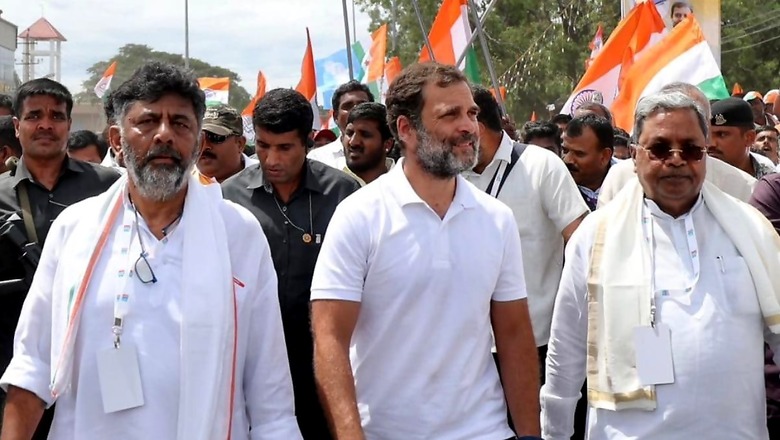
views
It may be naïve to read too much into the BJP’s humiliating defeat by the Congress in the recent Karnataka assembly elections, magnifying its impact at the national level in the run-up to next year’s Lok Sabha polls. However, it would also be unwise to minimise the larger significance of the BJP losing its only foothold in the entire southern India, that too so comprehensively. It is therefore important to analyse the implications of the Karnataka electoral outcome in a balanced manner without getting carried away by wishful thinking, viewing it as a game changer, or of no national consequence at all.
Supporters of the ruling party will no doubt point out with some justification that Karnataka has in the past voted differently quite often in state and national polls. For instance, in both the past two state assembly polls in 2013 and 2018, the BJP did quite poorly, although, in the last election, it managed to emerge as the largest party but well short of a clear majority. However, as enthusiasts of Prime Minister Narendra Modi will no doubt remember, his personal wizardry swept Karnataka in both the parliamentary polls in 2014 and 2019, just a year after the tepid show by the BJP to get power at the local level.
Yet a closer examination of the past decade in Karnataka’s evolving politics reveals that the involvement of Mr Modi in earlier assembly polls was far less high-profile than in the current one. He was almost missing from the state landscape during the 2013 assembly polls and did not campaign much in the next five years later. In striking contrast, this time around the Prime Minister descended in the last week of the election campaign on the state like a flaming meteor from the skies breathing Hindutva fire on his political opponents, projecting himself as the only keeper of the holy grail in Karnataka.
The fact that Mr Modi’s crusade of turning a state election into a national one adorned with religious zealotry in an attempt to pulverise the Congress tactics of sticking to bread-and-butter issues laced with charges of corruption against the incumbent BJP government so badly backfired cannot be ignored. The fact that the Congress has managed to make major inroads into areas across the state earlier dominated by the BJP besides gobbling up a fast-fading third political force Janata Dal (S) with an eight per cent vote lead over the BJP that might grow larger in the immediate future does not augur well for the latter even in next year’s parliamentary polls. With no leader to replace the retired old warhorse BS Yediyurappa, the BJP could swiftly slip into political disarray much like a similar state assembly poll defeat resulted in West Bengal earlier. This is bound to affect its parliamentary seat tally from Karnataka regardless of the Prime Minister’s personal showmanship.
Despite his surface bluster, Mr Modi is acutely aware that every seat lost will hurt in next year’s Lok Sabha polls and the very concept of a BJP-free south India has a resonance not only in the south but could dent his invincible aura across the country so carefully crafted by his propaganda machine. He knows that the BJP’s oldest allies like Bal Thackeray’s Shiv Sena, Badals’ Akali Dal, and Nitish Kumar’s Janata Dal (U) are now arrayed against him and the party would have to fight tooth and nail alone in most constituencies. If the Congress and other opposition parties play their cards well, the Prime Minister’s march to a third successive term may not be such an easy stroll as political pundits predict if his party continues to sink at a regional level.
The BJP would be in far more trouble if indeed the Congress and the Opposition are able to move beyond the obvious joy and relief at the Karnataka results and swiftly get down to brass tacks on a tactical plan rather than an overarching strategic vision to meet the challenge of 2024. The Karnataka polls are just the latest proof that both the Prime Minister’s larger-than-life profile and the politics of religious polarisation can be defeated when met with a determined but innovative effort to capture the public imagination with mundane but real-life grassroots issues. The messaging has to be cleverly tweaked from state to state, region to region, and even district to district across the country, which would require widespread coordination between political workers, community leaders, and NGOs.
On the political front, the Congress has to forget all delusions of grandeur in the wake of the Karnataka triumph and decide in which states the vastly shrunk party is still best placed to take on the BJP in 2024 and focus its resources and energy. It should ask for other opposition parties to collaborate in this venture in return for its own collaboration in states where the Congress, however mighty once, is no longer a major force. The rest of the Opposition would do well to at least immediately start working on a blueprint for this collaborative exercise and see how far this is feasible.
The biggest incentive both for the Congress and the opposition parties to work with each other against the BJP for the 2024 challenge is that if the BJP storms to another majority, that could not just mark another low in their political fortunes but imperil the very existence of all parties, and bring an unholy end to the era of competitive politics.
The writer is a Delhi-based political commentator. The views expressed in this article are those of the author and do not represent the stand of this publication.



















Comments
0 comment